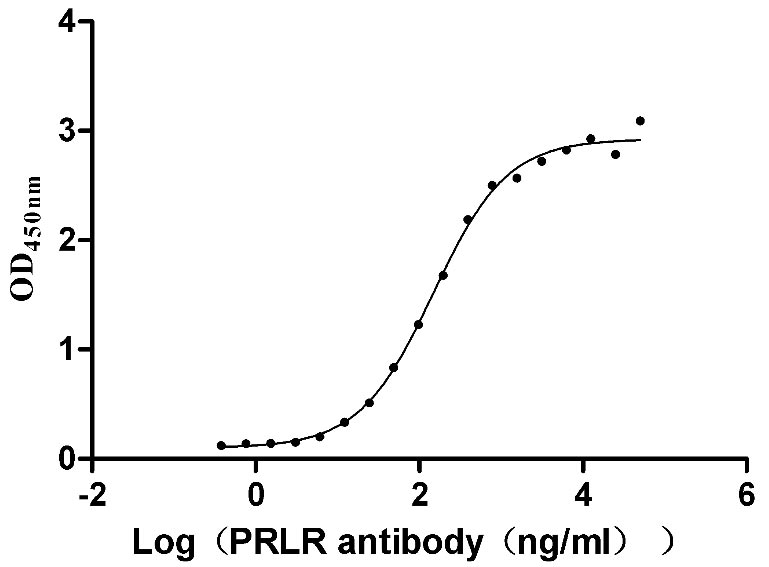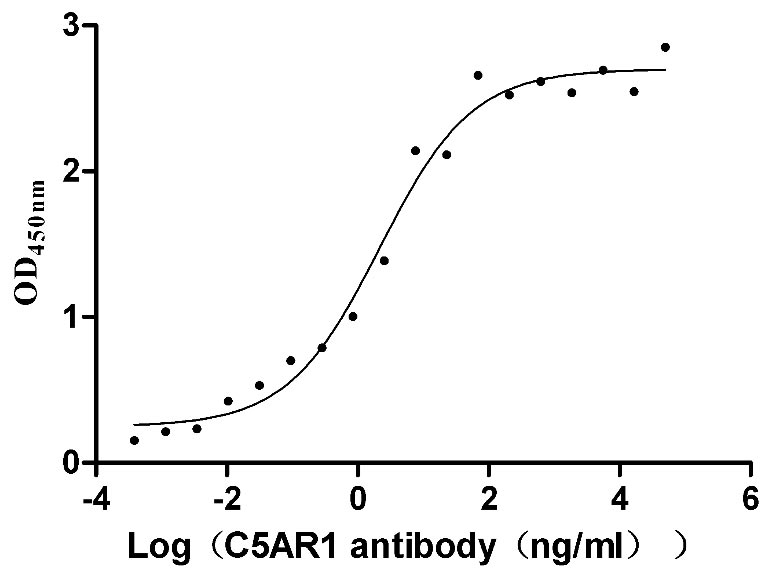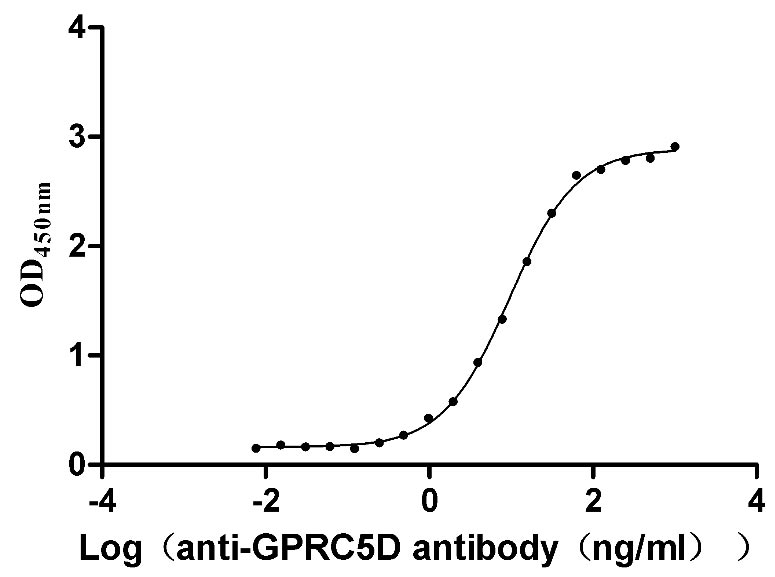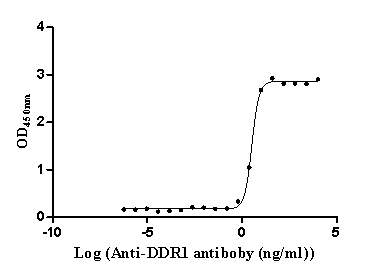Recombinant Human CD276 antigen (CD276), partial
-
中文名稱:Recombinant Human CD276 antigen(CD276),partial,Yeast
-
貨號:CSB-YP733578HU
-
規(guī)格:
-
來源:Yeast
-
其他:
-
中文名稱:Recombinant Human CD276 antigen(CD276),partial,Yeast
-
貨號:CSB-EP733578HU
-
規(guī)格:
-
來源:E.coli
-
其他:
-
中文名稱:Recombinant Human CD276 antigen(CD276),partial,Yeast
-
貨號:CSB-EP733578HU-B
-
規(guī)格:
-
來源:E.coli
-
共軛:Avi-tag Biotinylated
E. coli biotin ligase (BirA) is highly specific in covalently attaching biotin to the 15 amino acid AviTag peptide. This recombinant protein was biotinylated in vivo by AviTag-BirA technology, which method is BriA catalyzes amide linkage between the biotin and the specific lysine of the AviTag.
-
其他:
-
中文名稱:Recombinant Human CD276 antigen(CD276),partial,Yeast
-
貨號:CSB-BP733578HU
-
規(guī)格:
-
來源:Baculovirus
-
其他:
產(chǎn)品詳情
-
純度:>85% (SDS-PAGE)
-
基因名:
-
Uniprot No.:
-
別名:4Ig B7 H3; 4Ig-B7-H3; AU016588; B7 H3; B7 homolog 3; B7-H3; B7H3; B7RP-2; CD_antigen=CD276; CD276; CD276 antigen; CD276 molecule; CD276_HUMAN; Costimulatory molecule; Flags: Precursor; PSEC0249; UNQ309/PRO352
-
種屬:Homo sapiens (Human)
-
蛋白長度:Partial
-
蛋白標(biāo)簽:Tag?type?will?be?determined?during?the?manufacturing?process.
The tag type will be determined during production process. If you have specified tag type, please tell us and we will develop the specified tag preferentially. -
產(chǎn)品提供形式:Lyophilized powder
Note: We will preferentially ship the format that we have in stock, however, if you have any special requirement for the format, please remark your requirement when placing the order, we will prepare according to your demand. -
復(fù)溶:We recommend that this vial be briefly centrifuged prior to opening to bring the contents to the bottom. Please reconstitute protein in deionized sterile water to a concentration of 0.1-1.0 mg/mL.We recommend to add 5-50% of glycerol (final concentration) and aliquot for long-term storage at -20℃/-80℃. Our default final concentration of glycerol is 50%. Customers could use it as reference.
-
儲存條件:Store at -20°C/-80°C upon receipt, aliquoting is necessary for mutiple use. Avoid repeated freeze-thaw cycles.
-
保質(zhì)期:The shelf life is related to many factors, storage state, buffer ingredients, storage temperature and the stability of the protein itself.
Generally, the shelf life of liquid form is 6 months at -20°C/-80°C. The shelf life of lyophilized form is 12 months at -20°C/-80°C. -
貨期:Delivery time may differ from different purchasing way or location, please kindly consult your local distributors for specific delivery time.Note: All of our proteins are default shipped with normal blue ice packs, if you request to ship with dry ice, please communicate with us in advance and extra fees will be charged.
-
注意事項(xiàng):Repeated freezing and thawing is not recommended. Store working aliquots at 4°C for up to one week.
-
Datasheet :Please contact us to get it.
相關(guān)產(chǎn)品
靶點(diǎn)詳情
-
功能:
Earlier studies found that B7H3 (also known as B7H3) promotes the activation of T cells. Chapoval et al. confirmed that in the presence of anti-CD3 antibodies, B7H3 can promote the proliferation of CD4 and CD8+ T cells and selectively promote the secretion of IFN-γ. And B7H3 transfection into tumor cells can enhance the killing ability of CTL. Further research found that only TLT-2 transgenic cells could bind to mouse B7H3 with high affinity, and TLT-2 was determined to be the receptor molecule of B7H3. Moreover, Hashiguchi et al. confirmed that the B7H3-TLT-2 pathway enhanced T cell activation. However, Leitner et al. did not find the specific binding of B7H3 to TLT-2 by flow cytometry, therefore, the exact receptor molecule of B7H3 is still unclear.
On the other hand, studies have found that B7H3 can also suppress T-cell immune responses. Some studies have shown that B7H3 can inhibit human and mouse T cells by activating or inhibiting NFTA (nuclear factor for activated T cells), NF-KB (nuclear factor kB) and AP-1 (activator protein-1) pathways. activation. In addition, results have demonstrated that B7H3 may inhibit T cell immune responses by inhibiting the activity of Thl. The study of Leiner et al. also found that B7H3 can down-regulate the secretion of IL-2 in T cells to inhibit the activity of T cells. -
基因功能參考文獻(xiàn):
- High B7-H3 expression is associated with phyllodes tumors. PMID: 30486739
- characterization of the expression pattern and biological function of B7-H3 in brain gliomas; B7-H3 expression is regulated by multiple mechanisms and is potentially involved in the T-cell receptor signaling pathway; higher B7-H3 expression indicates a worse prognosis for glioma patients PMID: 30027617
- High expression level of B7H3 in muscleinvasive bladder cancer (MIBC) tissues is associated with a poor clinico-pathological status and poor prognosis, and promotes the development of MIBC in vitro and in vivo. PMID: 30132557
- Tumor B7-H3 expression was significantly higher in immunocompetent vs. immunosuppressed patients, largely driven by very low expression in HIV+ patients. PMID: 29484464
- Colorectal cancer (CRC) patients expressing both high B7-H3 and high B3GALT4 contributed to a significant decrease in overall survival. The expression of B3GALT4 in CRC is positively correlated with B7-H3 expression in vitro. B7-H3/B3GLAT4 may be used as dual prognostic biomarkers for CRC. PMID: 30131660
- this study shows reduced sB7-H3 expression in the peripheral blood of systemic lupus erythematosus patients PMID: 29423417
- High B7-H3 expression is associated with cervical cancer invasiveness. PMID: 28627681
- IDH1 and B7H3 cannot be used as independent prognostic factors, co-expression of IDH1 and B7H3 significantly correlated with the prognosis of CRC patients and may serve as a combined predictive marker. Thus, the correlation between IDH1 and B7H3 has been proven in vivo and in vitro. PMID: 29871819
- Our findings revealed that B7-H3 affect ovarian cancer progression through the Jak2/Stat3 pathway, indicating that B7-H3 has the potential to be a useful prognostic marker. PMID: 28765941
- metastatic melanoma cells with knockdown expression of B7-H3 showed modest decrease in proliferation and glycolytic capacity. PMID: 28513992
- results suggest that B7-H3 may be a valuable biomarker in determining tumor progression and prognosis of intrahepatic cholangiocarcinoma PMID: 29696716
- these results demonstrate that sB7-H3 promotes invasion and metastasis through the TLR4/NF-kappaB pathway in pancreatic carcinoma PMID: 27273624
- Inhibition of the B7-H3 immune checkpoint limits tumor growth by enhancing cytotoxic lymphocyte function PMID: 28685773
- Higher B7-H3 expression correlates with Gleason grade, prostate cancer stage and poor oncologic outcomes in prostatectomy cohorts. B7-H3 expression appears to be related to androgen signaling as well as the immune reactome. PMID: 27801901
- Review/Meta-analysis: High B7-H3 expression was a significant indicator of lymph node metastasis and advanced TNM stage in non-small cell lung cancer. PMID: 27835582
- B7-H3 promotes epithelial mesenchymal transformation in colorectal cancer cells by activating the PI3K-Akt pathway and upregulating the expression of Smad1. PMID: 27145365
- Plasma B7-H3 levels were decreased significantly in children subjected to pediatric general and cardiac surgery, which is closely associated with the severity of surgical stress. The negative correlation of plasma B7-H3 levels at day 1 and day 3 after surgery with surgical stress scoring implicates that the plasma B7-H3 level might be a useful biomarker for monitoring stress intensity during pediatric surgery. PMID: 27459969
- B7-H3 promotes the oxaliplatin resistance in colorectal cancer cells upregulating the expression of XRCC1 via PI3K-AKT pathway. PMID: 28676400
- Children with Mycoplasma pneumoniae pneumonia had significantly higher levels of sB7-H3 and IL-36 compared to control subjects. PMID: 27188891
- CD276 is broadly expressed by tumor cells and tumor vasculature but Is dispensable for tumor growth. PMID: 28399408
- B7-H3 hijacks SREBP-1/FASN signaling mediating abnormal lipid metabolism in lung cancer PMID: 27939887
- We found that B7-H3 promoted the Warburg effect, evidenced by increased glucose uptake and lactate production in B7-H3-expressing cells. B7-H3 also increased the protein levels of HIF1alpha and its downstream targets, LDHA and PDK1, key enzymes in the glycolytic pathway PMID: 27197253
- Upregulated sB7-H3 expression in MPEs is correlated with TNM stage of NSCLC and may serve as a potential biomarker for NSCLC-derived MPEs PMID: 27071700
- High expression of B7-H3 is associated with Colorectal cancer. PMID: 26787540
- Elevated B7-H3 expression is significantly associated with poor survival in cancer patients. (Meta-analysis) PMID: 27626927
- The results provide novel insights into the function of B7-H3 in cancer, and suggest that targeting of B7-H3 may be a novel alternative to improve current anticancer therapies. PMID: 26771843
- Suggesting that B7-H3 and Tregs may act cooperatively in tumor immune evasion, leading to poor outcomes for NSCLC patients. PMID: 26823710
- B7-H3 is one of the most strongly expressed B7-family molecules in AML and merits further investigation. PMID: 26376842
- findings demonstrate that activation-induced B7-H3 expression on synovial monocytes has the potential to inhibit Th1-mediated immune responses and immunomodulatory roles affecting RA pathogenesis. PMID: 26702052
- B7H3 promotes cell migration and invasion through the Jak2/Stat3/MMP9 signaling pathway in colorectal cancer PMID: 26151358
- B7-H1 and B7-H3 are independent predictors of poorer survival in patients with non-small cell lung cancer. PMID: 25609202
- B7-H3 may play an important role in asthma exacerbation and was a useful clinical biomarker to evaluate asthma exacerbation. PMID: 26108069
- found that the N-glycans of B7-H3 from Ca9-22 oral cancer cells contain the terminal alpha-galactose and are more diverse with higher fucosylation and better interaction with DC-SIGN and Langerin on immune cells than that from normal cells PMID: 26438868
- Study shows that B7-H3 promotes mantle cell lymphoma progression and its knockdown significantly enhances the chemosensitivity. PMID: 25872657
- These results demonstrated that B7-H3 expression in acute leukemia predicts an unfavorable outcome. PMID: 25130683
- Our results indicate that B7-H3 expression in cervical invasive squamous cell carcinoma may play an important role in overcoming CD8(+) T-cell immunoregulation to acquire aggressive growth. PMID: 25675190
- Data shows that B7-H3 is aberrantly expressed in gastric cancer. In addition to modulating tumor immunity, B7-H3 may have a novel role in regulating SGC-7901 cell metastasis. PMID: 25120098
- Overexpression of B7-H3 in CD14+ monocytes is associated with renal cell carcinoma progression.B7-H3 might play an important role in angiogenesis of renal cell carcinoma mediated by CD14(+) monocytes. PMID: 25416051
- Data show that immunoglobulin-like transcript 4 (ILT4) increases the expression of the co-inhibitory molecule B7-H3 through PI3K/AKT/mTOR signalling. PMID: 26149216
- IL-2/IL-2R and B7-H3 pathways may be involved in the progression of clear cell renal cell carcinoma PMID: 25089268
- The overexpression of B7-H3 induces resistance to apoptosis in colorectal cancer cell lines by upregulating the Jak2-STAT3 signaling pathway. PMID: 25684945
- B7-H3 was significantly up-regulated on monocytes in rheumatoid arthritis patients, while soluble B7-H3 in serum was decreased. A polymorphism variant, B7-H3-T-A-C-T, was shown to be associated with the incidence of RA and the decreased release of sB7-H3. PMID: 25931383
- B7-H3-mediated STAT3 signaling pathway is an important mechanism for inducing M2-type polarization of tumor associated macrophages. PMID: 25370943
- The study confirms the overexpression of B7-H3 in colorectal cancer and shows the main localization of the protein in cytoplasm and cell membrane. PMID: 25139714
- High level of serum B7-H3 in patients with Hepatocellular Carcinoma is caused by the increased expression of a newly discovered spliced soluble B7-H3 isoform in carcinoma and peritumor tissues. PMID: 24194851
- Data indicate that six sites of co-stimulatory molecule B7-H3 gene have single nucleotide polymorphisms variations and five sites are related to the pathogenesis of rheumatoid arthritis (RA). PMID: 25200161
- Study shows that CD276 can be used to discriminate ECs from malignant tissue from ECs from normal tissue. In addition, CD276(+) CEC do occur in higher frequencies in patients with advanced cancer. PMID: 24892449
- Data indicate that the expression of membrane B7-H3 (mB7-H3) in peri-tumor normal tissues was higher than that in tumor tissues, and it can serve as an assistant diagnostic marker for hepatitis B virus-associated hepatocellular carcinoma (HBV-HCC). PMID: 25001942
- B7H3 and ATP1B3 are overexpressed in tumor endothelial cells, favoring an angiogenic phenotype. PMID: 24236063
- Thus, B7-H3 may have a critical role in primary hepatocellular carcinoma and it may enhance tumor escape from the immune surveillance of CD8(+) T cells. PMID: 24787022
顯示更多
收起更多
-
亞細(xì)胞定位:Membrane; Single-pass type I membrane protein.
-
蛋白家族:Immunoglobulin superfamily, BTN/MOG family
-
組織特異性:Ubiquitous but not detectable in peripheral blood lymphocytes or granulocytes. Weakly expressed in resting monocytes. Expressed in dendritic cells derived from monocytes. Expressed in epithelial cells of sinonasal tissue. Expressed in extravillous trophob
-
數(shù)據(jù)庫鏈接:
Most popular with customers
-
Recombinant Human Growth hormone receptor (GHR), partial (Active)
Express system: Mammalian cell
Species: Homo sapiens (Human)
-
Recombinant Human Prolactin receptor (PRLR), partial (Active)
Express system: Mammalian cell
Species: Homo sapiens (Human)
-
Recombinant Human C5a anaphylatoxin chemotactic receptor 1 (C5AR1)-VLPs (Active)
Express system: Mammalian cell
Species: Homo sapiens (Human)
-
Recombinant Human G-protein coupled receptor family C group 5 member D (GPRC5D)-VLPs (Active)
Express system: Mammalian cell
Species: Homo sapiens (Human)
-
Recombinant Human Epithelial discoidin domain-containing receptor 1 (DDR1), partial (Active)
Express system: Mammalian cell
Species: Homo sapiens (Human)
-
Recombinant Human Claudin-4 (CLDN4)-VLPs (Active)
Express system: Mammalian cell
Species: Homo sapiens (Human)
-
Recombinant Macaca fascicularis CD44 antigen (CD44), partial (Active)
Express system: Mammalian cell
Species: Macaca fascicularis (Crab-eating macaque) (Cynomolgus monkey)
-
Recombinant Human Desmoglein-3 (DSG3), partial (Active)
Express system: Baculovirus
Species: Homo sapiens (Human)




















